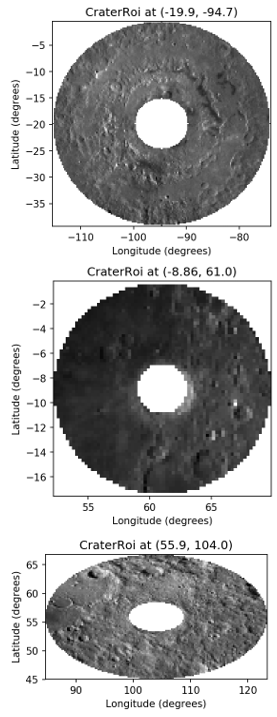A package for impact crater data science.
Project description
Overview
Welcome to craterpy (formerly ACERIM), your one-stop shop to crater data science in Python!
This package is in the alpha stage of development. You can direct any questions to Christian at cj.taiudovicic@gmail.com. Bug reports and feature requests can be opened as issues at the issues board on GitHub.
You can use craterpy to:
work with tables of crater data in Python (using pandas)
load and manipulate image data in Python (using rasterio)
extract, mask, filter, and compute stats on craters located in your images
plot crater data in python!
Craterpy currently only supports simple cylindrical images and requires you to provide a table of crater locations and sizes (e.g. it isn’t a crater detection program). See the example below!
Example
Craterpy in action:
import pandas as pd
from craterpy import dataset, stats
df = pd.DataFrame({'Name': ["Orientale", "Langrenus", "Compton"],
'Lat': [-19.9, -8.86, 55.9],
'Lon': [-94.7, 61.0, 104.0],
'Rad': [147.0, 66.0, 82.3]})
moon = dataset.CraterpyDataset("moon.tif")
stat_df = cs.ejecta_stats(df, moon, 4, ['mean', 'median', 'std'], plot=True)

stats_df.head()

New users should start with the IPython notebook tutorial for typical usage with examples.
Note: This package currently only accepts image data in simple-cylindrical (Plate Caree) projection. If your data is in another projection, please reproject it to simple-cylindrical before importing it with craterpy. If you would like add reprojection functionality to craterpy, consider Contributing.
Requires
Craterpy requires python >3.7 and is tested on Ubuntu and OS X. If you would like to use craterpy on Windows, we recommend getting the Windows Subsystem for Linux (WSL) and installing it from the bash shell.
It’s core dependencies are:
rasterio
pandas
numpy
matplotlib
Installation
The most reliable way to get craterpy is by installing git and poetry to clone and install the package.
You can clone and install craterpy with the following steps:
# Clone this repository $ cd ~ $ git clone https://github.com/cjtu/craterpy.git # Enter the repository $ cd craterpy # Configure poetry poetry config virtualenvs.create true --local poetry config virtualenvs.in-project true --local # Install craterpy with poetry $ poetry install # Check installation poetry version # Either open a Jupyter server $ poetry run jupyter notebook # Or activate the venv from your Python editor of choice # The venv is path is ~/craterpy/.venv/bin/python
Installing from pip
Craterpy is also listed on PYPI and can be installed with pip:
pip install craterpy python -c "import craterpy; print(craterpy.__version__)"
Installing into a conda environment
You can similarly install craterpy into a conda environment using pip:
# Create conda environment conda create -n craterpy python=3.7 # Activate the environment conda activate craterpy # Install dependencies (optional, but may fix dependency issues on some platforms) conda install -c conda-forge rasterio pandas, numpy, matplotlib # Install craterpy pip install craterpy # Test installation python -c "import craterpy; print(craterpy.__version__)"
Trouble installing craterpy? Let us know on the issues board.
Now that you have craterpy installed, head over to the tutorial to get started!
Installing from a fork
Fork this project from craterpy on GitHub.
Clone your fork locally
Navigate to the craterpy root directory and install with:
python setup.py install
Warning: This installs the newest craterpy updates which may not be production stable. Installing from pip automatically pulls the previous stable release.
Documentation
API documentation is available at readthedocs.
Contributing
There are two major ways you can help improve craterpy:
Bug Reporting and Feature Requests
You can report bugs or request new features on the issues board. If you are reporting a bug, please give a detailed description about how it came up and what your build environment is (e.g. with conda list).
Becoming a contributor
craterpy is seeking new contributors! If you are interested in open source and want to join a supportive learning environment - or if you want to extend craterpy to suit your own crater analysis - consider contributing to the project! See CONTRIBUTING.rst for details on how to get started.
Development Environment
The development environment is specified in .environment.yml. It can be built automatically in a new conda environment in a few simple steps:
Fork craterpy on GitHub.
Clone your fork, then cd into your local craterpy repository.
Install the dependencies using poetry (steps above).
Run a jupyter notebook with:
poetry run jupyter notebook
Test your changes:
poetry run pytest craterpy
Apply code formatting with black:
poetry run black craterpy
Run pylint to check your code style:
poetry run pylint craterpy
Hack away!
Read more about testing, contributing and style in CONTRIBUTING.rst.
Citing craterpy
For convenience, this project uses the MIT Licence for warranty-free ease of use and distribution. The author simply asks that you cite the project when using it in published research. The citable DOI can be found at Zenodo by clicking the badge below.

To read more about citable code, check out Zenodo.
Contact
If you have comments/question/concerns or just want to get in touch, you can email Christian at cj.taiudovicic@gmail.com or follow @TaiUdovicic on Twitter.
License
Copyright (c) 2021- Christian Tai Udovicic. Released under the MIT license. This software comes with no warranties. See LICENSE for details.
Contributors
Craterpy was developed with the aid of these wonderful people!
Project details
Download files
Download the file for your platform. If you're not sure which to choose, learn more about installing packages.











